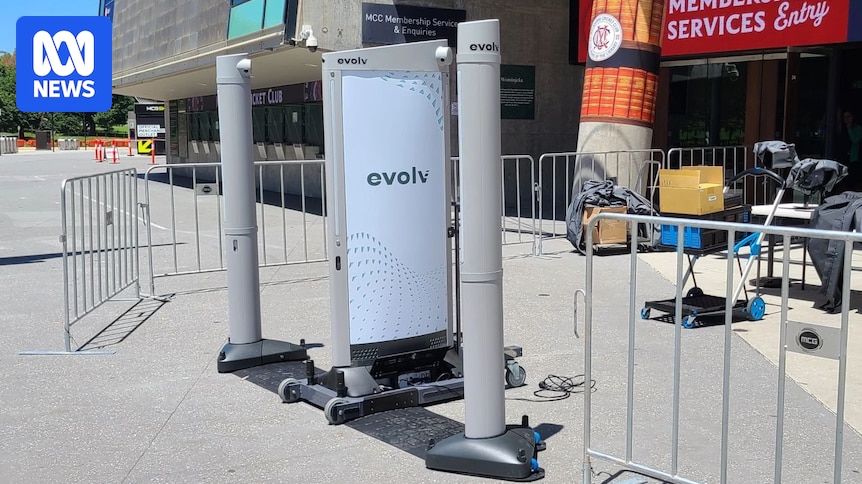AI Security Screening: A Promising Solution or a Recipe for Disaster?
In a world increasingly focused on safety, especially in crowded venues, AI security screening has emerged as a cutting-edge solution for stadiums and public events. At first glance, it seems to offer a fantastic way to keep fans safe while ensuring that the long queues at the gates become a thing of the past. But recent events have thrown a spotlight on the potential flaws in this technology, raising questions about its effectiveness and reliability.
The Promise of AI Screening
Imagine a stadium where thousands of fans can glide through security gates thanks to advanced AI technology. Scanners identify potential threats, identifying a small group for further checks, allowing everyone else to enter without delay. It’s an appealing prospect for both event organizers and attendees.
But during a recent football match at the Melbourne Cricket Ground (MCG)—Australia’s largest stadium—this new promise was called into question when two men allegedly managed to carry firearms into the venue, evading detection by the AI-driven security system known as Evolv Express. The alarming event unfolded amidst the excited crowd, only coming to light when sharp-eyed police noticed suspicious behavior and conducted a search.
A Shocking Breach of Security
Fortunately, no one was hurt during the incident, and authorities have ruled out any ties to terrorism. Still, the security breach has sent shockwaves throughout the community. Victorian Premier Jacinta Allan has demanded a thorough review of safety protocols at the venue, while Stuart Fox, the chief executive of the Melbourne Cricket Club (MCC), expressed deep disappointment at the incident.
The Evolv Express system, touted for its ability to detect concealed weapons, has faced scrutiny in the past, especially in the United States, where similar technology has failed to prevent incidents in schools. Critics argue that the reliance on AI could lead to dangerous oversights, even as it promises greater efficiency in managing large crowds.
How Did This Happen?
Stuart Fox attributed the security lapse to human error, revealing that while the technology spotted items of concern, further manual checks were inadequately performed due to a "breakdown in thoroughness." Neil Fergus, a former ASIO agent and security expert, echoed this sentiment, stating that the AI-based system is designed to allow smooth entry for the majority, only flagging individuals for secondary checks when necessary.
However, if the detection technology generates too many false positives—indicating potential threats when none exist—operators can become desensitized. Fergus emphasized that this could lead to complacency among security staff, particularly in high-pressure environments like stadiums.
The Challenges Ahead
Critics are raising concerns about the overall reliability and transparency of such systems. Conor Healy, director of IPVM, a research firm focused on surveillance technology, highlighted findings suggesting that Evolv has exaggerated the screening capabilities of its scanners. According to IPVM, the false positive rates for these systems can range anywhere from 5% to 60%, depending on the sensitivity settings. This level of inconsistency could foster false confidence among security personnel.
Moreover, there are fears that organizations might reduce security staffing after implementing these technologies, putting both staff and the public at risk. While Evolv claims its clients could optimize security operations by cutting expenses significantly, this approach needs careful examination, especially given the recent incident at the MCG.
A Glimpse into the Future
Despite these challenges, security experts like Fergus believe that AI-based systems like Evolv Express are the "way of the future." When properly calibrated and supervised, these technologies could deliver faster and more efficient security screenings than traditional methods, making for a more enjoyable experience for fans. Drawing on past lessons from event security, it’s clear that proper implementation, regular testing, and staffing are essential to avoid another incident like the one at the MCG.
For now, Victoria’s Minister for Tourism, Sport, and Major Events has called for an immediate strengthening of security measures at the MCG and plans to disseminate findings from the review to other venues across the state.
In conclusion, the promise of AI security screening is tempered by the reality of its implementation. As technologies evolve, so too must our understanding of their capabilities and limitations. The incident at the MCG might serve as a wake-up call, not just for Australian venues, but for all organizations relying on cutting-edge security technologies.
The AI Buzz Hub team is excited to see where these breakthroughs take us. Want to stay in the loop on all things AI? Subscribe to our newsletter or share this article with your fellow enthusiasts.




